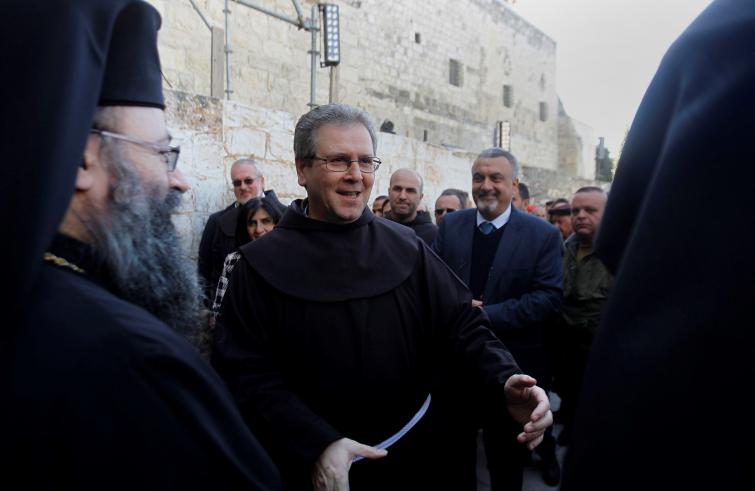Protest
The Church of the Holy Sepulchre in Jerusalem stays closed for the third day. The three Churches who share management of the property– the Greek-Orthodox Patriarchate, the Custody of the Holy Land and the Armenian Patriarchate – continue the protest against the decision of Jerusalem’s municipality to impose a tax of over 151 million Euros, and against the bill on Church property. The Custos of the Holy Land, Father Francesco Patton, analysed the situation.

The Church of the Holy Sepulchre in Jerusalem stays closed for the third day. The protest of the three Churches that share management of the basilica – the Greek-Orthodox Patriarchate, the Custody of the Holy Land and the Armenian Patriarchate – continue the protest against the decision of the municipality of Jerusalem to impose municipal tax payments, known as Arnona, on church-owned properties not used as places of worship. The requested sum amounts to approximately 650 million shekel (over 151 million Euro). The protest also involves a bill that exclusively targets Church property and is thus considered discriminatory. For Theophilos III, Greek-Orthodox Patriarch of Jerusalem, Father Francesco Patton, Custos of the Holy Land, and Nourhan Manougian, Armenian Patriarch of the Holy Land, the decision is “in flagrant violation of the status quo” and constitutes an “attempt to weaken Christian presence in Jerusalem.” SIR interviewed the Custos of the Holy Land.
(Photo: AFP/SIR)
Father Patton, the Basilica of the Holy Sepulchre remains closed for the third day. When do you plan to reopen it for  pilgrims’ worship?
pilgrims’ worship?
For the time being the doors remain closed. We hope to reopen them as soon as possible. We are awaiting changes in the present situation. All other Christian Churches have conveyed their solidarity. We are deeply saddened for the pilgrims for we realize that they are paying the highest price. We have been thoroughly committed to inviting them here in the past years and now they are being denied the possibility of praying in the main site of our faith. However, I hope they will understand that our decision is not against them.
We have taken this stand not to avoid paying taxes but to protect the small Christian community.
Have you received feedback from Pope Francis?
 I suppose he is following, in some way, the developments of the situation.
I suppose he is following, in some way, the developments of the situation.
How did such a strong protest come about?
It gradually mounted. The municipality of Jerusalem has recently sent a request of retroactive payment of taxes that fails to consider the status quo of the Churches in the Holy Land. Under the Ottoman rule, the British and Jordanian mandate, and under Israel, the status quo has always been respected.
The Churches in Jerusalem don’t do business for profit, they all run social and charitable works that evidently release the burden on the municipality.
Just to mention a few examples: the Custody in the old City of Jerusalem offers accommodation free of charge to over 300 Christian families, and this is a social, charitable work. The schools are another example. Every year we have to balance the budget of schools with insufficient revenues to ensure their survival. Whatever income there may be it is not meant for profit but to subsidize these works.
There are no privileges.
Not to mention the fact that that the inflow of high numbers of pilgrims in Jerusalem is a source of income for the municipality thanks to the money they spend in the city.
In your opinion, why has the mayor of Jerusalem Nir Barkat, taken this decision? Trump’s decision to transfer the US Embassy to the Holy City on May 14 and Premier Netanyahu’s legal troubles are a suspicious coincidence…
The question should be asked to him or to local political analysts.
For us it isn’t a political issue.
All we want is to solve this problem.
In any case the mayor’s unilateral decision came as a surprise given that the issue of tax exemptions is enshrined in the Fundamental Agreement between the Holy See and the State of Israel signed in 1993. The Bilateral Working Commission between the Holy See and the State of Israel has been working on the implementation of the chapters regarding Church tax treatment and Holy Sites property for several years already.
This decision is not unprecedented, other municipalities had made similar attempts in the past. In the case of Jerusalem it’s an extremely delicate situation because it involves the Status Quo. There are consuls in charge of specific issues pertaining to the Holy City. Jerusalem’s unique nature requires caution in taking unilateral decisions. But there is something I wish to add on the reasons of the protest …
What?
We oppose the “Church lands bill” that was scheduled for debate at the Israeli Parliament (Knesset) and postponed as a result of our protests. If approved, this law, which targets the Greek-Orthodox Patriarchate in particular, would allow the State to appropriate lands sold by the Greek-Orthodox Church to private investors, which could become the object of legal disputes in the future. We consider it discriminatory: if there is a problem in this respect it should be solved and regulated to everyone’s benefit and not to the detriment of the Churches.
This way of promoting laws that affect specific parties – today it involves the Greek-Orthodox Patriarchate, tomorrow it could be the turn of another Church – is unacceptable. Regulations of this kind unquestionably place a burden on the Christian presence in Jerusalem.

The retroactive taxes claimed by the Municipality of Jerusalem to the Churches exceed 150 million euros. Have you made an estimate of the specific sums that the various Catholic Churches present in the Holy City would have to pay?
We didn’t calculate these amounts. In fact it would be very complicated because we would have to identify the sums due by the Latin Patriarchate, by the Custody of the Holy Land and by all other Churches of Eastern rite present in Jerusalem such as the Maronite, the Melkite Churches, and so on; in addition to the various male and female Institutes and Congregations.
What do you plan to do next: will you continue with the protest? And until when?
This morning we had a meeting with the other Church leaders in Jerusalem. The priority is solving the following two problems: the tax issue and the Church lands Bill.
We are awaiting some form of interlocution.
It isn’t a political issue. It’s not a matter of lack of respect towards the State of Israel, with which we have good relations. It involves two specific problems that involve the municipality and a draft law, which was postponed for now, but it could be proposed again in the short term. We are working on a new statement. It’s important to be firm and united in our position especially in view of the onset of dialogue, provided we are given the opportunity.
We are far too familiar with the “divide and rule” concept.